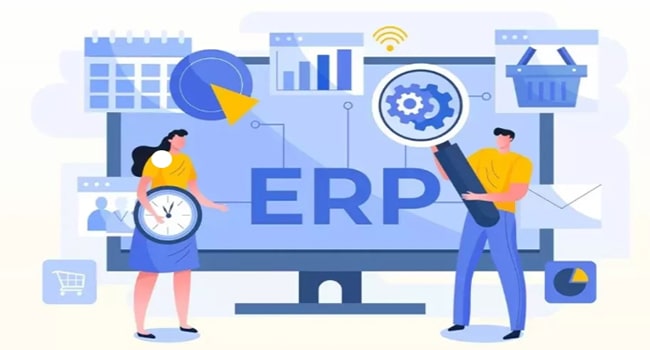ERP Online: Streamlining Business Operations in the Digital Age
In today’s fast-paced and interconnected business environment, organizations are constantly seeking innovative ways to streamline operations, enhance efficiency, and drive growth. Enterprise Resource Planning (ERP) systems have long been recognized as a cornerstone for achieving these objectives.

With the advent of cloud computing, ERP Online has emerged as a transformative solution, offering businesses unprecedented flexibility, scalability, and accessibility. This article explores the concept of ERP Online, its key features, benefits, and considerations for implementation.
What is ERP Online?
ERP Online, also known as cloud-based ERP, refers to ERP systems that are hosted and accessed over the internet rather than being installed on local servers within an organization. This cloud-based approach eliminates the need for on-premises hardware and infrastructure, offering businesses a more flexible, cost-effective, and scalable solution for managing their core business processes.
Key Features of ERP Online
Accessibility and Mobility
One of the primary advantages of ERP Online is its accessibility. Employees can access the system from any device with an internet connection, enabling remote work, real-time collaboration, and seamless communication across the organization.
Scalability
Cloud-based ERP solutions are inherently scalable, allowing businesses to easily add or remove users, adjust storage capacity, and expand functionalities as their business grows. This scalability ensures that the ERP system can adapt to changing business needs without requiring significant upfront investments in new hardware or software.
Security
Contrary to common misconceptions, ERP Online solutions often offer robust security features, including data encryption, multi-factor authentication, and advanced threat detection mechanisms. These security measures help protect sensitive business data and ensure compliance with industry regulations.
Cost-Effectiveness
ERP Online eliminates the need for expensive hardware, maintenance, and IT infrastructure costs associated with traditional ERP systems. Businesses can benefit from predictable subscription-based pricing models, reducing total cost of ownership and making it a more cost-effective option, especially for small and medium-sized enterprises (SMEs).
Real-Time Updates and Collaboration
Cloud-based ERP systems provide real-time updates, enabling employees to access up-to-date information, collaborate more efficiently, and make informed decisions based on accurate data. This real-time access to business insights and analytics can significantly improve decision-making and operational efficiency.
Benefits of ERP Online
Flexibility and Adaptability
ERP Online offers businesses greater flexibility to adapt to changing market conditions, regulatory requirements, and customer demands. The cloud-based nature of these solutions allows for easy updates, new feature integrations, and seamless scalability, ensuring that businesses can remain agile and competitive in a dynamic marketplace.
Improved Efficiency and Productivity
By automating manual tasks, streamlining workflows, and eliminating redundant processes, ERP Online enhances operational efficiency and boosts productivity across the organization. Employees can focus on strategic initiatives and value-added activities, driving growth and innovation.
Enhanced Business Insights
ERP Online provides advanced analytics, reporting, and business intelligence tools that enable organizations to gain valuable insights into their operations, identify trends, and make data-driven decisions. These insights can help businesses optimize performance, identify opportunities for growth, and mitigate risks effectively.
Reduced IT Burden
With ERP Online, businesses can offload the responsibility of managing and maintaining IT infrastructure to the ERP vendor. This reduces the IT burden on internal teams, allowing them to focus on core business activities and strategic initiatives rather than routine maintenance and support tasks.
Disaster Recovery and Business Continuity
Cloud-based ERP solutions offer built-in disaster recovery capabilities, ensuring business continuity in the event of hardware failures, natural disasters, or other unforeseen disruptions. This resilience and reliability provide businesses with peace of mind, knowing that their critical data and operations are protected and accessible at all times.
Considerations When Choosing ERP Online
When selecting an ERP Online solution for your business, consider the following factors:
- Vendor Reputation and Reliability: Choose a reputable ERP vendor with a proven track record of delivering reliable, secure, and high-quality cloud-based solutions.
- Data Migration and Integration: Ensure the ERP system can seamlessly integrate with existing systems and support smooth data migration from legacy systems.
- Customization and Support: Opt for a cloud-based ERP solution that offers customization options tailored to your business needs and provides comprehensive support and training to ensure successful implementation and adoption.
- Compliance and Security: Verify that the ERP Online solution complies with industry regulations and standards, and offers robust security features to protect sensitive business data.
Conclusion
ERP Online represents a significant shift in the way businesses approach Enterprise Resource Planning, offering a flexible, scalable, and cost-effective solution for managing core business processes in today’s digital era.
By leveraging the power of cloud computing, ERP Online enables organizations to adapt to changing market dynamics, improve operational efficiency, and drive growth and innovation. Investing in the right ERP Online solution can pave the way for enhanced productivity, agility, and success for businesses across industries and sizes.